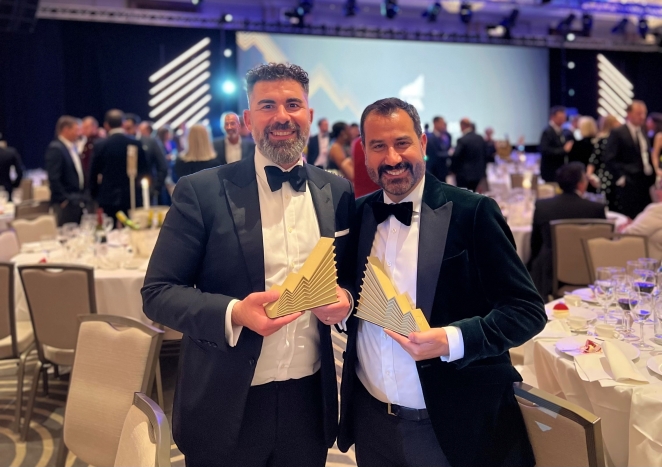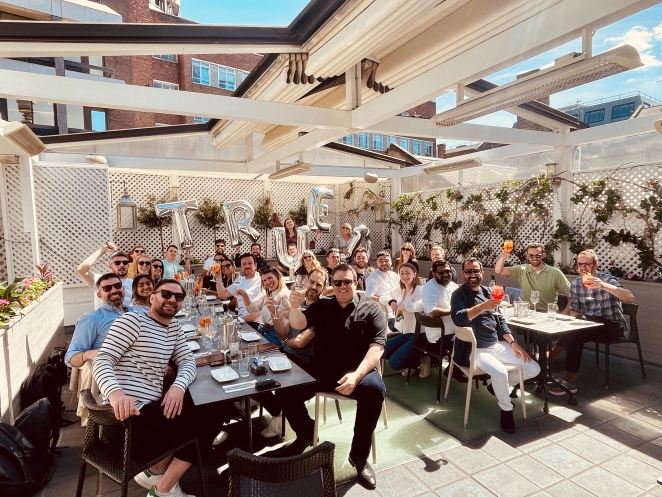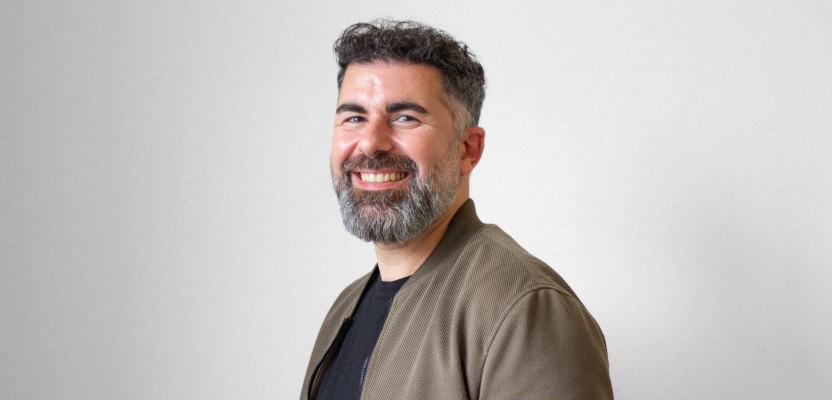Tell us a bit about your role! Is there a “typical” day?
To be honest, there isn’t a typical day. I split my time between working on the agency strategy and my role as Head of Effectiveness for our clients. It’s a strategic but creative role, as I’m working with our planners and creative teams to ensure our output produces the most effective outcomes.
One hour I could be in a board meeting; the next, I could be in a creative briefing or review; and the next, I could be crunching numbers on campaign performance. It’s an extremely varied role which keeps me on my toes, and I love that.
What was the biggest challenge in getting to your current position?

I came into the industry pretty late, aged 26, and within four years, I had started the agency with my business partner, Richard Parsons. As you can imagine, it was a very steep learning curve. I had previously worked in business development, account management and creative production roles, so I had a well-rounded foundation to start from but still a huge amount to learn in a short space of time – particularly when it came to running a business.
I massively benefitted from having a more experienced business partner by my side who provided invaluable guidance in those moments when things could feel overwhelming.
What is your personal background and what role did it play in your career?
I’m a second-generation Cypriot immigrant. My grandfather came here in the 1940s, and he drilled his work ethic into me from a very young age. That you only get what you earn. I’ve been working since I was 12 years old, doing all sorts of things from painting and decorating to delivering pizza and furniture and working in theatre and DJing.
I was raised with the mindset that you look for opportunities and do what you can to make them happen. I think this played a big part in my drive to start the agency so early in my advertising career.
What is your biggest career-related win? What is your biggest loss?

Winning two IPA effectiveness awards last year is something I will always be proud of. We became the first ever B2B agency to win one and the first to take home the new special award for Best B2B. There have been plenty of achievements day to day, but those awards really stand out for me.
In terms of losses, it was probably when I realised that I wouldn’t make it in the music industry. But the experience taught me that sometimes it’s better to let things go. I probably spent a couple more years trying to follow that dream than I needed to, so I have learned to move on and to pivot more quickly.
Which individuals and/or agencies do you gain inspiration from? Do you have any heroes in the industry?
I’ve always really admired Crispin Porter Bogusky as an agency and what it stands for. A lot of its thinking is referenced regularly within the agency. The agency’s focus on fame being the number one objective and the fact that it usually comes from unexpected approaches is something we mirror as a core agency principle.
As a result, we tend to think very broadly, always taking a media agnostic approach with the ultimate aim of finding unconventional solutions to problems.
BBH is another agency I massively admire. It’s delivered some of the most iconic campaigns of all time and has an unwavering focus on marketing effectiveness.
As an individual hero, I think Andy Nairn, co-founder of Lucky Generals, is a legend. He’s done some phenomenal work, and the amount of effectiveness awards he has won is mind-boggling. I’d give him a big shout-out.
If you could go back to your teenage years, would you have done things differently? Do you have any regrets?

It’s difficult to look back with regret. Life is a journey, and you take important lessons at every stage. In terms of my career and where I have ended up, it would have been useful to know more about the advertising industry when I was younger.
Had I known more about it, I may have started my career a few years earlier. But then again, I wouldn’t have such varied experiences to bring to this career if I hadn’t taken the journey I did.
If you weren’t in your current industry, what would you be doing?
I’d like to think I’d be doing something related to music. It’s always been my second passion, and I take a really keen interest in the music for our campaigns. Music is rarely given the attention it deserves in B2B.
The challenge tends to be that budgets don’t allow for licencing of famous tracks, so you end up using stock libraries. But even within that, I think giving it real attention is important.
What’s your one big dream for the future of the industry?

For B2B, we need a broader understanding that marketing isn’t a sales support function but a driver of commercial growth. There’s been some great research from The B2B Institute in the past couple of years that supports the value of brand building in B2B. My dream for the industry is that people really understand that and start investing at the proper levels, particularly when it comes to the creative product.
There’s simply not enough investment in advertising production, which often makes it challenging to produce memorable work that cuts through the clutter. We need a greater appreciation of the value of creativity and the investment that goes into the execution of great ideas.
I’m sure this won’t take long because all the evidence points to it being the right thing to do. Many brands are realising this, and it’s clear that we’re going through a bit of a renaissance period for the category.
What are your top tips for aspiring creative professionals?
Immerse yourself in the industry. Keep reading and keep up to speed with the latest campaigns that are winning awards. Get your head around why those campaigns are so good (or bad). Interrogate the ideas.
The best ideas are rarely completely original. They tend to be inspired by something you may have seen in the past. So, the more you see and know, the more those creative juices flow.
When you think about your team, what is the thing that matters to you the most?

Empathy for each other’s roles, collaboration, and understanding the pressures others might be going through. It’s also important for people not to be too precious about their roles and to appreciate the work and contributions of others.
If you are a creative, make sure you are listening to the ideas that other people come up with, whether that’s an account exec or a planner. The best creatives have an ability to spot great ideas and nurture them, regardless of where they came from.
Do you have any websites, books or resources you would recommend?
There are some great books on the industry. “Truth, Lies and Advertising: The Art of Account Planning” by Jon Steel was my first real introduction to account planning. It gives you the background and discipline needed, as well as the power that planning can have in inspiring creativity. Likewise, “How Not To Plan: 66 ways to screw it up” by Les Binet and Sarah Carter has become a bible for planners.
I also recommend “Madison Avenue Manslaughter: An inside view of fee-cutting clients, profit-hungry owners and declining ad agencies” by Michael Farmer. It explains the decline of ad agencies over the years and how we’ve slowly become more and more devalued. It gives the history of how we got to where we are and how we can start selling value back to clients, not just time and materials.
It’s critical that we look back at where we came from; that’s where we learn the biggest lessons.
I also recommend “Radical Candor: How to get what you want by saying what you mean” by Kim Scott. It’s about how to give and receive feedback. I think it’s essential to create a culture where people can have honest conversations and challenge each other to keep progressing professionally. This book helps frame this for managers at all levels.




